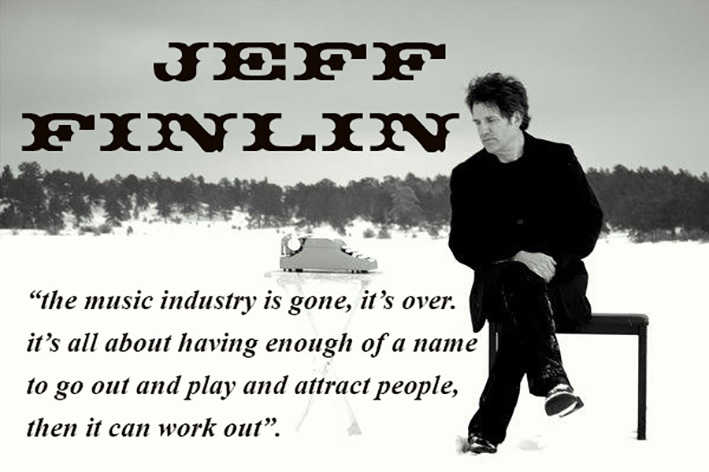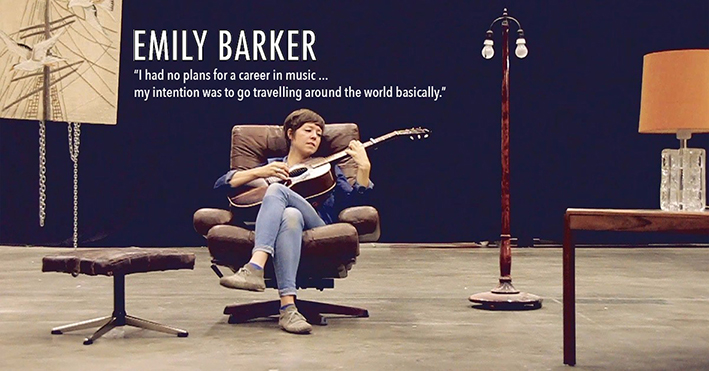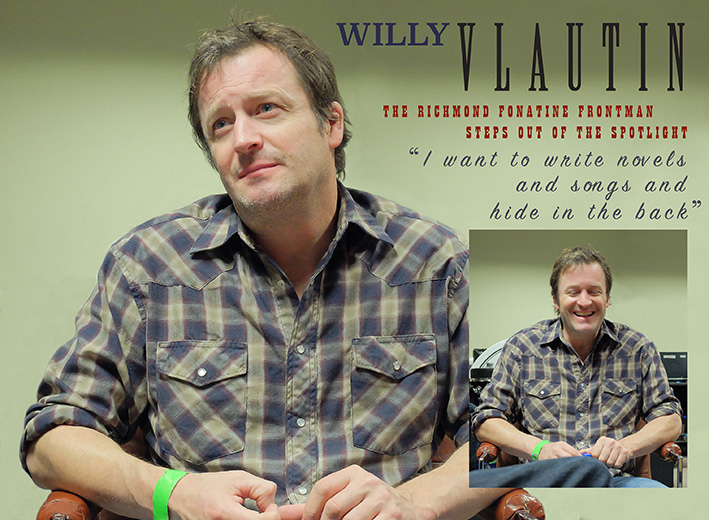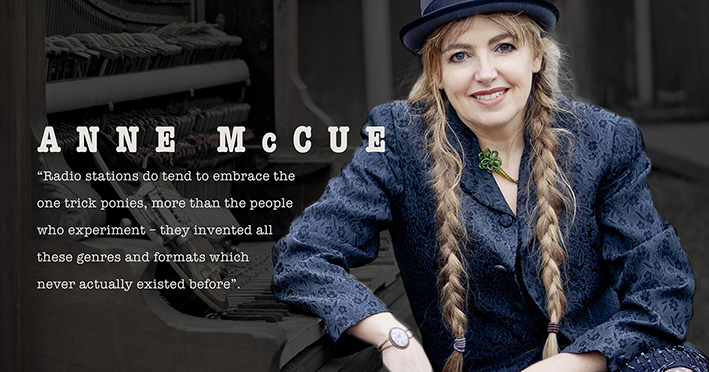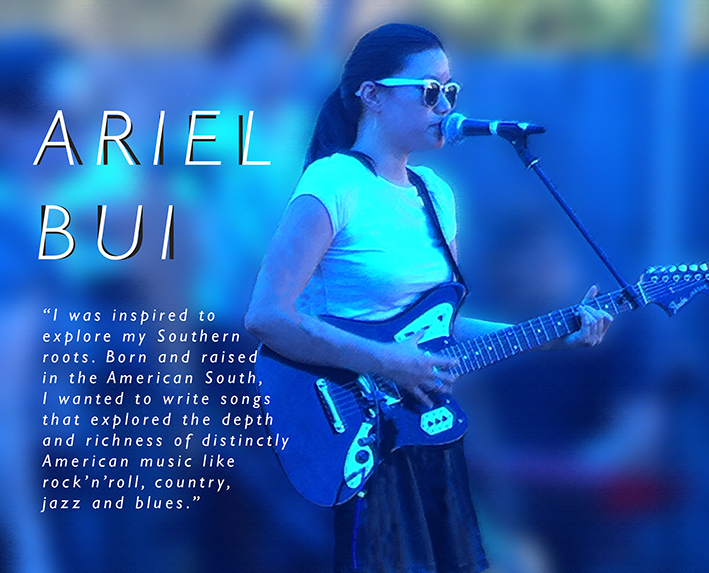
One of the most interesting new artists to come to the attention of Lonesome Highway at The Americana Music Festival in Nashville this year was a young female artist currently residing in Nashville by the name of Ariel Bui. The daughter of Vietnamese parents who emigrated to the States at the end of the Vietnam war, Bui is a classically trained musician who studied voice and piano at Rollins College in Winter Park, Florida focusing on Piano Pedagogy, the art and business of teaching piano. She founded Melodia Studio in Nashville which currently provides education in piano to over twenty students and intends widening the project to include education for children as young as infants
Bui showcased her recently recorded self-titled album at Fond Object on September 25th, introduced on stage by JP. Harris whose annual Sunday Morning Coming Down outdoor event has become a not to be missed feature of the festival.
Lonesome Highway was interested to learn more about Bui and her experimental and quite unique take on Americana which she and her excellent band performed during her forty-five-minute slot.
How would you describe your music?
It is challenging to describe my music, because I draw inspiration from so many different places and strive to defy genre. Since moving to Nashville in 2011, I was inspired to explore my Southern roots. Born and raised in the American South, I wanted to write songs that explored the depth and richness of distinctly American music like rock’n’roll, country, jazz & blues. However, with a background in classical music and a variety of other styles, I wanted to meld everything together in a way that was classic yet subtly experimental. I suppose I would describe my music as a unique melting pot of styles, with honest lyricism and delivery.
Your album launch in Nashville featured the album in its totality played in the same order as it on the record. It seems to start with a somewhat traditional country feel and move further away from country and into more classical and jazzy territory towards the end. Was this intentional in choosing the order of the songs?
One of my main concerns going into recording this album was how to cohesively put together songs that sounded so different from each other. Producer Andrija Tokic not only assured me he would help choose what songs to include on the album from over twenty demos that I sent him, but he would also help me decide on song order.
When making an analog album with the intention that it is going to be on a vinyl record, there are a lot of considerations. You must consider how long each side needs to be in order to maintain best audio quality, with a maximum of 18 minutes per side being the sweet spot. Then you must consider the physics of the grooves, with sparser slower songs sounding better towards the end or inside of each side. Then, there’s also the consideration that each side becomes its own stand-alone unit, where typically Side A hosts the more conventional hits (in this case, the more country-sounding songs) while Side B hosts the less conventional.
Honestly, by the time we were done recording I was so mentally and emotionally exhausted, I gladly let Andrija take the producer lead on song order. After poring over his song order, I made only one change which was to make To All the Cowboys the first track instead of Jump the Gun. Andrija wanted the first track to immediately grab the listener with the catchy bass line, but on listening I wanted the first track to slowly sneak up on the listener and honour my long-time friends and fans who know that my last three releases were solo acoustic albums. I wanted to slowly introduce the band production. And to honour my classical sensibilities and background, I wanted the tonal centre to move gracefully from track to track. To All the Cowboys ends closer to where Jump the Gun begins, but then Jump the Gun ends on E where the next few songs hang out. Then we move from E to A with Moon Over Kentucky and slow the country tempo down to end Side A with Since You Went Away. Side B starts out with a fully orchestrated, spaghetti-western style interpretation of a song that’s on my first record Disguised As Fate from 2009 and slowly gets “weirder” from a single drop D tuning to a double drop D tuning until it ends on the stand-along jazzy track Honey, Moon. The way Honey, Moon ends, so jazzily and dreamily, feels like a cliff-hanger to me. A musical mystery of what’s to come next.
Take us through the recording of the album at The Bomb Shelter in Nashville and the influence of producer Andrija Tokic
I knew I wanted to record this album for analog vinyl. For years, many of my friends around town highly recommended Andrija Tokic at The Bomb Shelter, the little pink analog recording studio in East Nashville. One night, I went to Mickey’s Tavern and ran into Jem Cohen (Fond Object Records, The Ettes) who was playing foosball with Andrija. After being introduced, I sent Andrija some demos, visited the studio, and we decided to work together.
Between meeting in January and booking our June recording session, Andrija and I were in pre-production. I recorded rough demos of over twenty songs, trying to capture the essence of my songs in my kitchen onto my ipad. Andrija and I worked on dwindling down which ten or eleven songs we would want to record and what kind of instrumentation and vibe I wanted.
He recommended two session musicians, percussionist Dave Racine and multi-instrumentalist Jon Estes, assuring me of their precision and expertise. He had many spaghetti western ideas, and ideas of how to not make the songs sound like stereotypical Music Row country songs. He liked my weirder songs. He assured me that, though he had many ideas, he would always respect and defer to my artistic vision.
Once in the studio, we started with Appraisal, listening to the demo a couple times while Jon and Dave charted out the chord progressions and song structure. Andrija discussed with us what he was thinking for instrumentation, vibe, and sound. Then we would record the bed tracks live, meaning the main bare bones of the tracks were recorded live with me singing and playing guitar in an isolated booth, while Dave and Jon played drums and bass in the bigger room at the same time. We went through all the songs this way, charting the songs, discussing production ideas, and recording the bed tracks live to 2-inch tape with me in an isolated booth. Then, Jon overdubbed all the other instruments, from keys of all kinds, to supplementary guitars, cello, pedal steel, and some percussion.
We ran out of time after those first four days in the studio, so we booked some more dates in the fall. At that point, my friends Emma Berkey and Lizzie Wright came in to do a bulk of the harmonizing vocals while Jem Cohen offered additional support as an extra ear and voice for harmonies. Andrija acted as motivator, coach, and conductor, boosting morale while offering direction, suggesting ideas and changes and engineering everything. Working with tape, you only get a limited number of tracks to record with, so Andrija also called a lot of shots on which takes to keep and which takes to re-do and tape over.
Once harmonizing vocals were complete, Andrija and I chose a few songs for me to re-record main vocal tracks over. At first I felt a little insecure that I hadn’t “nailed” the vocal tracks while recording with the band the first time, but singing vocal overdubs probably became one of my favourite parts of recording. I got to set my guitar down and just sing. And not only sing, but sing my heart out to match the now fully-orchestrated tracks, not just sing over my own guitar or even with a small band. However, there were a few songs where we left the original vocal tracks, such as in Since You Went Away. There’s even a part where I accidentally hit the microphone with my face, which will never be able to be cut and pasted out.
Andrija then mixed the songs from the 24-track 2-inch tape to ¼-in tape, adjusting analog effects, manually fading parts in and out and adjusting levels live as the 24-tracks were condensed into a few tracks. We collaborated on things like which takes and mixes to keep, and I got to be my perfectionistic, detail-oriented self-asking that certain breath sounds were kept or cut, certain things end abruptly rather than fade. After mixing was done, we finalized a song order and Andrija literally cut the ¼” tape and taped the songs into the right order for the reels.
Eventually, I flew up to Brooklyn with the mixed tapes and sat in on the analog mastering session with Paul Gold at Salt Mastering. It was like watching a mad scientist at work in his lab, with all these gadgets, circular knobs and mathematical notes. He fine-tuned everything and I’m grateful I was able to fly up again when I was ready to press the record to vinyl. I got to watch Paul take all his mathematical notes, and in real-time witness the ¼” tape play through the board where he would adjust all the knobs at the start of each song as the grooves were cut into the lacquer, the template for what would become the metal stamps to stamp out the analog vinyl records. Not only was it a huge learning experience for me to witness this process, but I got to be there to catch any weird irregularities that may have arisen.
Was there a particular reason for choosing to live and record in Nashville?
It happened a little by accident, or fate, depending on how you look at it. After graduating with a degree in music from Rollins College in 2009, I took a totally different turn and moved to Taos, New Mexico, living off the grid for a couple years, working first with radically-sustainable architecture firm Earthship Biotecture and then with Americorps’ Energy Conservation Crew at Rocky Mountain Youth Corps. When my term at Americorps ended, I had plans to move to Port-au-Prince, Haiti to work in Disaster Relief as a freelance activist with a Non-Governmental Organization (NGO). But my life came to a head when I went to Burning Man in 2011 to convene with Burners Without Border and the NGO I was planning on working with.
At Burning Man, no money is exchanged for an entire week, and it really changes the way people interact with themselves and with others. While I was questioning what role I could play to make the world a better place, especially if the world were to end in, say, 2012 or something, it really became clear to me that I had to come to terms with my calling as a musical artist. Attending Burning Man and living in New Mexico, appropriately dubbed the Land of Enchantment, I was forced to do some serious soul-searching. I had put music off as an egotistical hobby at that point, but others appreciated my unique musical artistry and urged me to pursue music for my own sake and for theirs.
So when I returned to Taos and decided not to move to Haiti, I had to figure out what to do next. I had no shelter and no job. Someone I met at Burning Man travelled to Taos to intern with Earthship Biotecture and needed a place to park his RV. We struck up a deal. He could park his RV on my little quarter-acre of land if I could live in it, too. But winters in Taos are brutal, dropping to temperatures of -30 degrees Fahrenheit, and winter was coming. So, we struck up another deal. We could drive my car to his hometown near Toronto, Canada where he could find work and we could elope. Then I could become a Canadian citizen and hopefully receive benefits and make a living as a Canadian artist. But the relationship was untenable and shortly after arriving in Canada, it became extremely clear it was not going to work.
At this point, I was running out of money and options, so my father and stepmother convinced me to move in with them in the suburbs of Dallas, TX. In between Toronto and Dallas was an Earthship friend outside of Bowling Green, Kentucky and a close old friend in Nashville, TN. I spent a couple weeks helping Jacob Mudd with his Earthship build in Kentucky, pounding dirt into tires, playing music and reminiscing about Taos.
Then I headed off to Nashville, where I was reunited with my old friend Dylan Ethier. Dylan and I have been friends since high school and our friendship has revolved around music. We collaborated on my first record, Disguised As Fate, where he recorded some of the tracks, mixed the album, finalized the album art, and released it on his boutique label Love Note Collectables in 2008. During the week or two I visited Nashville, I met amazing people who were artists, musicians, industry people, and activists, and Dylan and I recorded my third album, Niche EP, in his living room. Dylan moved to Nashville to study sound engineering at SAE, yet he and I have always been a fan of lo-fi albums and artists. I love collaborating with Dylan because he understands and respects my artistic vision and it was a no-brainer when we recorded Niche EP live to tape, from a single mic straight to his reel-to-reel tape recorder with no editing and minimal mixing or EQing. We wanted the organic room of the sound and of my performance. It broke my heart a little when we converted the tape to digital files to then become limited edition cassette tapes, released on boutique cassette label, Tent Revivalist. At any rate, I felt like this third record was much more natural and indicative of the way I wanted to record moving forward.
I left Nashville for Dallas where I quickly had another falling out with my father, fled to stay with my mentally ill mother in my birth town of Shreveport, Louisiana for a couple weeks where I fell in love with a late-night college radio DJ, and headed back to Nashville where I crashed on Dylan’s couch until I could find work and get myself established in Nashville. It was clear I could definitely build a life and career as a musician here, amongst like-minded people and friends. It’s taken a few years to work up to the point where I am now, and it is proving to be the best move I’ve ever made.
Comparisons have been made with another wonderfully talented artist Angel Olsen. Are you comfortable being placed in a category of female experimentalists such as Olsen and Fiona Apple?
Not only would I be honoured to be placed in a category with female experimentalists such as Angel Olsen and Fiona Apple, but it is a dream of mine. I will admit, I get really star-struck by people I admire deeply, so I dream deep-down of just getting to become friends and equals with my heroes. That way I’m not only a blubbering fangirl, but hopefully, fingers-crossed, a respectable peer in the world of music and art.
The word experimental is funny, because I feel like what makes artists like Fiona Apple or Angel Olsen experimental is not that they necessarily do anything avant-garde, but more so that they are genuine and unique, which is what I strive to be.
Where did your musical inspirations come from growing up to lead to a career as a singer-songwriter and performer?
Gosh, I have so many influences, it’s hard to narrow it down. But when I started writing music at around fifteen years-old, it was contemporary artists like Fiona Apple and Regina Spector that inspired me to pursue song writing and performing. Fiona’s performing, lyricism, artistry and production really drew me and has stuck with me over the years. When I was fifteen, Regina Spector had two stripped down, self-released albums out (11:11 and Songs) and was gigging around New York City. I followed her on her website where she would communicate with her fans on a chat forum, but I was too young to get into the bar shows during my summer vacations in New York. Instead, I did by chance get to witness Beyoncé perform with Destiny’s Child when they performed their first album for free in Time Squares’ Virgin Megastore. If you bought the album you could watch them perform in the book store and get their autographs, which I did. Following these humble women’s careers from the early stages has been very inspiring.
Ultimately though, it was the underground music scene in Brevard County, Florida that inspired me to write and perform. When I was a teenager, there were countless bands making music that will never be heard by most ears because it all happened in garages and weird DIY spaces, on burnt CDs and Myspace profiles never to be re-released. The spirit of making art for art’s sake and sharing it within a community of friends, that will always be an integral part of who I am musically. My teenage years in Brevard County, Florida was where I learned to write songs, perform live, record an album, book and promote shows, and do everything DIY. These skills and sense of community have laid the foundations for me to pursue a career as a singer-songwriter and performer, and now to hopefully evolve to reach a wider audience.
What artists in particular have inspired you in a manner that you would be proud to achieve in inspiring others?
On this album, I was inspired by older artists like Odetta, Patsy Cline, Hank Williams, Johnny Cash, Mississippi John Hurt, and Bob Dylan, while also being influenced by more modern artists like Angel Olsen, Fiona Apple, and The Ettes for being classy, unique, and genuine. Elliott Smith is also a huge inspiration to me for his song writing, guitar playing, and tasteful yet simple production. I also draw inspiration from bands like The Beatles, Radiohead, and Bjork because of the way that they have been able to evolve and change over time while remaining true to themselves as artists.
These artists, and too many others to name, have inspired me by making me feel less alone. Every artist is inspiring in different ways, but I find that authenticity and honesty carry through and that’s what speaks to me. I’ve felt inspired by the way people express their emotions, or execute a tone or performance, how they navigate their ever-evolving careers. But at the end of the day, I would be proud to inspire others in the way so many artists have inspired me to connect with ourselves, each other, and the entire planet and universe in a more honest and meaningful way.
Your lyrics appear both deep and very dark, in some ways a contradiction to your upbeat and buoyant personality. Do you consider song writing a necessary medium for you to comfortably express your inner feelings?
People seem to make the observation of this contradiction quite often, while the people who know me most don’t find the contrast surprising at all. In my daily life, I prefer to be upbeat and friendly, perhaps because I want everyone around me to be as comfortable as possible. However, I do absolutely consider song writing a necessary medium for me to comfortably express my inner feelings, and in a way, make people comfortable with their deep, dark feelings, too. I experienced a great deal of trauma as a child including child sexual abuse, and though I am a high-functioning individual who is not defined by my trauma, I live with many symptoms of PTSD. Coming from a family of immigrants who fled the Vietnam War, I have many theories about intergenerational trauma and epigenetics. Music is a healing force in my life, a meditative process where I commune with my subconscious and the collective unconscious. Without music and song writing, I honestly don’t think I would be alive today.
You combine your performing career with the Melodia Studio teaching vision which seems the ideal combination. Is it your intention to remain in Nashville and expand both projects?
Yes. As both musical careers grow simultaneously, I do often wonder what the future holds, but thus far my plans are to continue living in Nashville and to expand upon both my careers as a musical artist and as a musical educator ... and hopefully as a DJ at our new community radio station WXNA as well. I aspire to find a permanent live/work space, hopefully with the help of Nashville non-profit The Housing Fund’s Make A Mark Project which aims to help provide affordable live/work options for artists in Nashville. With gentrification and development on the rise, many artists and low-income residents of Nashville are getting forced out of the city.
I would eventually like to be able to provide a more permanent space not only for my students, but for other artists, teachers and their students as well. I currently have students as young as three and as old as retirees, however, I want to begin offering group classes for infants and toddlers and eventually be able to somehow offer lessons to underprivileged children and adults as well. My thoughts are that if my own musical career gets to a place where I need to step away from teaching sometimes, I can bring in other teachers and eventually other administrative assistants as well. But I feel very attached to Melodia Studio, because I helped form it and have stuck with it through thick and thin because of my belief that everyone could benefit from a musical education. Music is a healing force and it is beneficial to individuals and communities for an infinite number of reasons. Whenever I get overwhelmed by the task of promoting my own music, teaching offers me the opportunity to watch someone else discover their own musical journey, which is extremely humbling and gratifying. Combining a career as a musical artist and a career as a musical educator, really allows me to pursue my dreams while having a balanced, humble and stable grounding. It really is an ideal combination.
Interview and photography by Declan Culliton











